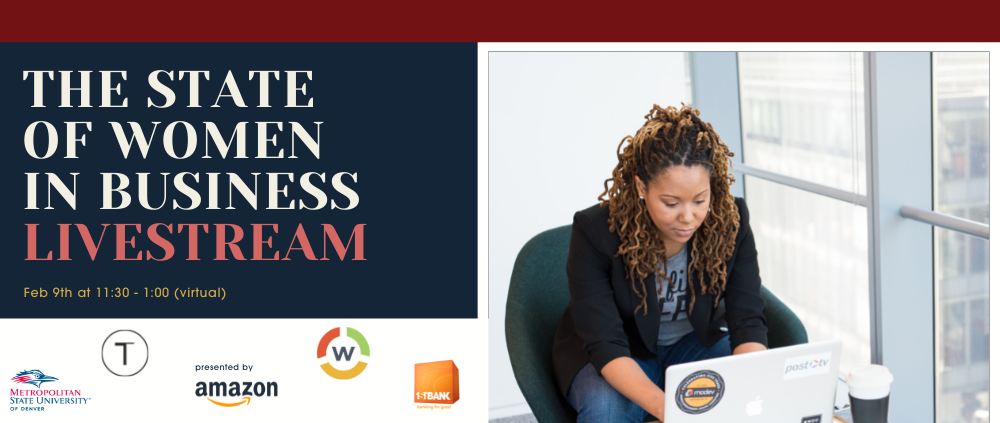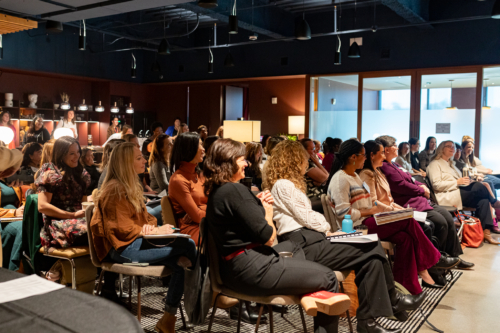FEBRUARY 2022 FOUNDER’S LETTER
“We are not makers of history. We are made of history.”
Understanding history is critical to knowing our present and thereby informing the future. History is valuable to set the stage, but I challenge each of you to use Black History Month in February and Women’s History Month in March to spend less time dwelling on what “was” and more time talking about what we can do moving forward so history doesn’t continue to repeat itself.
Looking towards a future informed by (but not tied to the past) is a running theme as we unveil a year-long research project conducted by TARRA, the Colorado Women’s Chamber of Commerce, and researchers at Metropolitan State University. This project titled: The Great Reset: Women in the Workplace will be featured at the State of Women in Business presented by Amazon on Feb 9, 2022 (Tickets are $10 with code TARRA22). In this report, we focus on Solutions to the Shecession and how we can collectively create a better world of work that is more equitable and effective for everyone.
Read on for details and a few of my favorite solutions chosen specifically to increase professional opportunities for women of color from our research paper. If you prefer live-action, please join us for the Livestream State of Women: Solutions to the Shecession co-hosted by TARRA and the Colorado Women’s Chamber of Commerce. We promise it will be the most inspiring lunch hour you have experienced this year!
USING HISTORY TO INFORM THE PRESENT
Crisis is one of history’s greatest opportunities for change. There has been no better time than ever before to create the kind of world we want to live in.
Equality movements have been around for over a century. There have been marches, changes to our constitution, quotas put in place and advertising campaigns. Large corporations have entire divisions focused on diversity initiatives and creating opportunities. Yet, while female and minority participation in the workforce has grown dramatically, we still only hold a small fraction of leadership and C-Suite roles, and the revenue of women- and BIPOC/AAPI-owned businesses is significantly less than that of our white, male peers.
As a society, we are striving towards equal opportunities for women to thrive and be successful in their careers but we still haven’t addressed or changed one of the most fundamental barriers—the workplace.
Equity in the workplace isn’t just a policy problem, it’s also a design and culture problem. If we want to create more opportunities for women to thrive in their professional careers, we must focus on creating the right ecosystem for them to thrive.
That is what we will begin to address at the State of Women in Business: Solutions to the Shecession, presented by Amazon on February 9, 2022. We will then use these solutions to begin earnest conversations with our government officials, leaders, business owners, executives, and (most importantly) each of you as individuals, to understand how TARRA can support and provide a stable foundation for a more equitable world. For more information, you can view the whitepaper.

THE GREAT RESET: WOMEN IN THE WORKFORCE REPORT
Presented at the event is our research paper, “The Great Reset: Women in the Workforce,” the culmination of a year’s worth of work.
In 2021, we hosted five Executive Roundtables with leaders, workers, professionals, and executives from around the state. Together we covered a variety of topics from childcare to equity and inclusion to supporting entrepreneurship and innovation.
Researchers Lynann “Annie” Butler and Cate Hill combined feedback from those roundtable discussions with field research to develop a list of actionable and workable solutions to creating a better future for women in the workforce. There are hundreds of ideas in this paper that can be harnessed by governments, corporations, small businesses, and individuals to redesign the workplace so it works for everyone.
One of the most sobering parts of the research has revealed that while the stage for white women has improved significantly over the last decade, when reflecting on the abysmal numbers for women of color outlined in the Women in the Workplace report—only 4% C-suite, only 5% Senior Vice President, only 7% Vice President, only 9% of Senior Managers/Directors compared to up to 5x that amount of white women and up to 12x for white men across categories. The great news is that some of Butler and Hill’s most achievable solutions are directed at creating more opportunities for women of color. These solutions include the following:
The Women’s Power Index
Arizona State University is developing a Women’s Power Index, whereby companies will have the opportunity to be rated on how well company policies and practices create inclusive working environments for women. The group is focusing first on the legal profession, with the goal of expanding focus to other industries on a regular basis. The index rates everything from the percentage of women in top leadership (especially in comparison to the percentage of entry-level hires), to pay, to access to Family Leave. The Women’s Power Index rating will be next to the stock market ticket, helping to inform equity-minded investors and affecting the market cap/stock price for publicly traded companies. The index is referred to as the ‘Yelp’ of inequality issues (ASU, 2021). Roundtable participants recommended using similar equity badges for BIPOC and AAPI individuals, which would impact City and State contracts.
Blind Performance Reviews
Perform blind performance reviews when giving salary increases, bonuses, etc. to avoid gender and skin color stereotypes from perpetuating wage gaps. Distribute salary increases, bonuses, etc. purely on performance with no gender/skin color association.
State Subsidized Daycare
State subsidized daycare for preschool children to increase mothers’ “labor market attachment” and it levels the playing field for children from disadvantaged backgrounds.
Sponsorship
Provide sponsorship, the advocacy, and advancement of strong performers within a professional network. Sponsors can advocate for promotion, assist with learning new skills, and increase visibility in professional networks, especially for women of color.
Thank you to the TARRA and CWCC teams for all of your hard work on this incredible project. Thank you to our MSU research team and sponsors and, most of all, thank you to the men and women who have persevered through unimaginable difficulties to create the world we live in today. We honor you today and all the days ahead.
Onward together,
Kate





